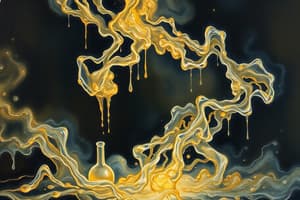Podcast
Questions and Answers
Which type of reaction involves two compounds exchanging ions to form two new compounds?
Which type of reaction involves two compounds exchanging ions to form two new compounds?
- Single displacement
- Decomposition
- Synthesis
- Double displacement (correct)
A combustion reaction typically produces energy in the form of heat and light.
A combustion reaction typically produces energy in the form of heat and light.
True (A)
What is the primary characteristic of a synthesis reaction?
What is the primary characteristic of a synthesis reaction?
Two or more reactants combine to form one product.
In a ______ reaction, a single compound breaks down into two or more simpler products.
In a ______ reaction, a single compound breaks down into two or more simpler products.
Match the type of reaction with its description:
Match the type of reaction with its description:
Flashcards
Synthesis reaction
Synthesis reaction
A chemical reaction where two or more substances combine to form a new, more complex substance.
Decomposition reaction
Decomposition reaction
A chemical reaction where a single compound breaks down into two or more simpler substances.
Single displacement reaction
Single displacement reaction
A reaction where a more reactive element replaces a less reactive element in a compound.
Double displacement reaction
Double displacement reaction
Signup and view all the flashcards
Combustion reaction
Combustion reaction
Signup and view all the flashcards
Study Notes
Synthesis Reactions
- Synthesis reactions involve two or more reactants combining to form a single product.
- The general form is: A + B → AB
- Examples include the combination of elements to form compounds (e.g., 2H₂ + O₂ → 2H₂O) and the combination of simpler compounds to form more complex ones (e.g., CaO + CO₂ → CaCO₃).
- Often accompanied by the release of energy, possibly in the form of heat or light.
- The key characteristic is the formation of one product from multiple reactants.
Decomposition Reactions
- Decomposition reactions are the opposite of synthesis reactions. One reactant breaks down into two or more simpler products.
- The general form is: AB → A + B
- Examples include the breakdown of compounds into elements (e.g., 2H₂O → 2H₂ + O₂) or the breakdown of a compound into simpler compounds (e.g., CaCO₃ → CaO + CO₂).
- Often require an input of energy, such as heat, light, or electricity to initiate the process.
- The defining feature is the breaking down of a single reactant into multiple products.
Single Displacement Reactions
- In single displacement reactions, an element replaces another element in a compound.
- The general form is: A + BC → AC + B
- The element "A" must be more reactive than the element "B" in the compound.
- Example: Cu + 2AgNO₃ → Cu(NO₃)₂ + 2Ag. Copper (Cu) is more reactive than silver (Ag), so it displaces silver from the silver nitrate compound.
- This type of reaction demonstrates relative reactivity of elements.
Double Displacement Reactions
- In double displacement reactions, the positive and negative ions of two ionic compounds exchange partners.
- The general form is: AB + CD → AD + CB
- Often results in the formation of a precipitate, a gas, or a molecular compound (e.g., water).
- Example: AgNO₃ + NaCl → AgCl + NaNO₃. Silver chloride (AgCl) is a precipitate that forms, causing the reaction to become evident.
- Typically involves ionic compounds.
Combustion Reactions
- Combustion reactions involve a substance reacting with oxygen to produce heat and light.
- Often involve hydrocarbons (compounds containing carbon and hydrogen) reacting with oxygen (O₂).
- The general form is: Hydrocarbon + O₂ → CO₂ + H₂O
- Example: CH₄ + 2O₂ → CO₂ + 2H₂O (methane burning in air).
- Combustion reactions are a significant source of energy and are fundamental processes in many industrial and natural processes.
Studying That Suits You
Use AI to generate personalized quizzes and flashcards to suit your learning preferences.




